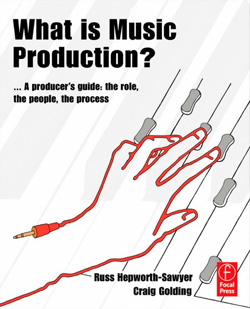
This is not to say that the producer needs to rule the session and artist or band with an iron fist (as this approach would develop another set of issues) but that she should always have a guiding influence on the proceedings and remain in control.
This is a little like when your Dad let you sit on his lap to drive the car… you had your hands on the wheel but he had his feet on the pedals!
So, as the producer you should hopefully be aware of the musical ideas that were being batted around and tried out and therefore you may have been able to see the issue developing.
However, it is not always this easy and you may have thought that going down a certain road was a good route to take, only to find that the result at the end was not as successful as it could have been.
At this point, being able to take stock and refocus on what is required is important. As unpopular as you might be with the band or artist, it is your responsibility to put your foot on the brake and consider where to go next.
It may be as simple as taking a short break and explaining why you feel the prechorus is just not happening.
Or all sitting in the control room with a coffee (or something stronger) to listen through the last few takes in order to gain a consensus of opinion.
Whatever the musical issue, be it a guitar part, vocal melody, or lyrical idea, it is your responsibility as the producer to get to the bottom of what is (or what isn’t) happening and put it right. It might not be your idea or solution that eventually puts things back on track, but this doesn’t matter, your focus should be on what is best for the song.
As we stated at the beginning of this subsection, what appears to be a creative or musical problem may sometimes turn out to be a personnel issue, in which case a different approach may be required. We will address this within our personnel category.
One other main musical or creative adversity that a producer may have to deal with in the studio session is a lack of technical or musical proficiency on an instrument or from a vocalist.
This is usually a sensitive issue due to the fact that ideally most producers would want the artist or group they are working with to be of the highest possible caliber. However, sadly this isn’t always the case and consequently as the producer you may need to employ considerable amounts of patience and diplomacy when dealing with such issues.
The common sticking points are usually (in no particular order): the drummer cannot play in time and struggles with a click, the singer is out of tune or time, or the bassist or guitarist is struggling to nail the guitar part (or solo).
The trick here really is to establish whether another factor is influencing or affecting their performance, or whether they are simply not able to deliver the necessary part. In terms of anything being out of tune, if it is an instrument and not a vocal then making sure that everything is in tune or tuned before the take is surely common sense.
You might think it would kill the vibe to keep having to suggest this, but even a great performance is no good if it’s not in tune. Therefore, getting the band or artist into a routine of always tuning up is worthwhile.
We have already discussed the importance of the headphone mix and how this can affect the performer in the previous section, so we won’t cover this in too much detail here.
However, suffice it to say if this is the issue it can be easily resolved by making sure that they can hear what they need to.
Once this is done, the performances should improve, particularly with vocalists. If this is not the case, then things become a little more tricky both in terms of the practical solution and how you deal with the performer as an individual (as they are probably getting a little uptight after a number of failed attempts or takes).
Suggesting a break to talk through the part is a good option, although if the takes are numerous then a breath of fresh air and a change of scene might well help the performer clear their heads. (Again, much of this is all about communication and diplomacy.)
